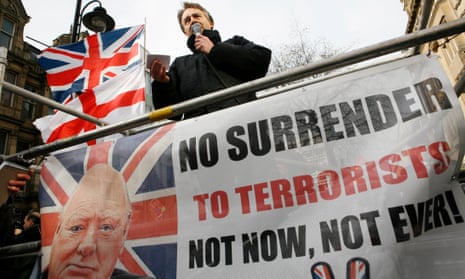The far-right movement, bolstered by foreign-born fascists living in the UK, is becoming increasingly violent as it seeks to orchestrate attacks against British Muslims, according to new analysis of the network of militant rightwing groups.
Buoyed by the normalisation of Islamophobic rhetoric by elements of the mainstream media, the increasingly radicalised ideology adopted by the UK’s far-right movement will lead to greater confrontation, says the anti-racist group Hope Not Hate.
The warnings come ahead of a planned demonstration by Polish neo-nazis in Manchester later this month in support of a “British white country”, which they have called: “Fuck Islam & Isis”. Intelligence indicates that a violent British far-right outfit, the North West Infidels (NWI), are planning to join them.
Although the influence of far-right groups like the BNP and EDL declined significantly last year “the numbers of those involved in more militant and violent groups are growing”, according to the report, which is published on Monday.
Last year, 61 far-right demos were staged in the UK, compared with 41 in 2014, although just eight attracted more than 150 people, the largest being a crowd of 300 recorded at a Pegida march in Newcastle last February, a year before the the group’s much-publicised march in Birmingham on Saturday.
However, one disquieting development recorded by campaigners is the growth of the Infidels, a network of regional fascist gangs pursuing a far more confrontational agenda, particularly against leftwing activists and trade unionists.
Another trend is the emergence of foreign-born far-right supporters living in the UK with one of the most active groups called Narodowe Odrodzenie Polski, meaning “the national rebirth of Poland”.

Centered mainly in London, Manchester and the south-east, the group, which has less than 100 members in the UK, is driving the reinvigorated Blood and Honour neo-Nazi music movement and has drawn praise from British groups like the National Front splinter faction, New Dawn.
Under the banner Zjednoczeni Emigranci Londyn (United Emigrants of London) members of the group are understood to have attacked a free music festival in north London 18 months ago, stabbing an anti-fascist campaigner and racially assaulting a Jewish man.
Last year, campaigners also documented a growth in far-right activists receiving survivalist, martial arts and outdoor training. Among the groups offering this training are the Misanthropic Division led by former members of the fascist Azov Battalion in Ukraine and the Italian nazi group, CasaPound.
Another organisation offering militants training is the far-right group Sigurd Legion, now known just as Legion. A video of one of its camps in Wales shows two men stripped to the waist punching each other as they practise unarmed combat, while others train with knives.
The neo-Nazi group National Action, along with other unaligned activists, were among the 80-100 individuals believed to have gone through these training camps during 2015. NA, who staged a “white man march” in Liverpool last year, are regarded as among the most organisationally sophisticated groups, being the only UK far-right group regularly using the dark web.
Nick Lowles, director of Hope Not Hate, said: “The rising militancy of Britain’s far right will lead to greater violence in 2016. This could be manifested in three ways: a general increase in anti-leftwing harassment and attacks; communal violence where gangs of far-right supporters clash with leftwingers, Muslim or east European youths; or, in extreme cases, terrorism.
“The underlying rhetoric of much of Britain’s far right is that a societal conflict – either between Muslims and non-Muslims or more generally with immigrant communities – is inevitable. For some, that means preparing for it or even encouraging it along.”
Most prominent among the Infidels groups is the NWI, closely aligned to the National Front and which last year organised or supported 12 demonstrations, twice the number of the previous year. The group has been linked to intimidation of trade unionists and anti-Ukip campaigners across the region.
Other divisions of the Infidel network include the North East Infidels, the Valleys Frontline Firm in south Wales, the South East Alliance. Nationally, they have a combined core of 150 violent members with a number of the Infidel leaders openly identifying themselves as Combat 18 supporters.
The fall in popularity of groups like the BNP, which fielded eight candidates in last year’s general election compared with 338 in 2010, is one of the reasons for the far right becoming more militant, says the report.
“The decline of the BNP and the rise of Ukip have thus brought a halt to the UK far right’s modernisation programme and seen the jettisoning of the moderate stance,” it states.
Other groups to have become less popular include the National Front, which suffered serious splits within its ranks and whose annual Remembrance Sunday demonstration was attended by 100 people compared with 300 in 2014. The NF’s new leader is Scottish and that alone is deemed unacceptable to many party members.
